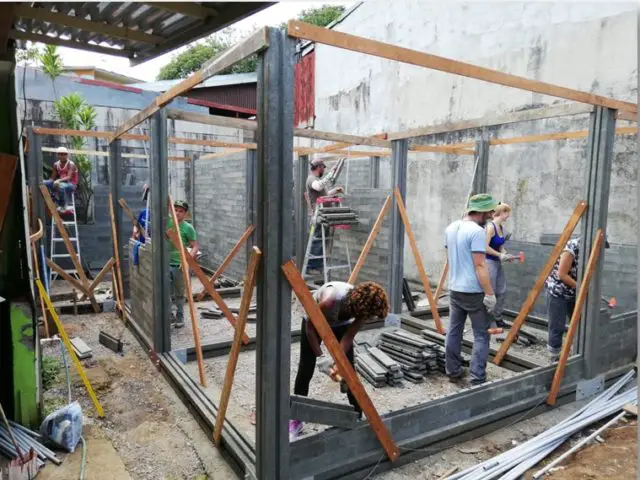Costa Rica will have its first plant in the country to building blocks from plastic waste, in such a way that they generate ecological construction systems. It will help promote a model of environmental, sustainable development, and contribute to the policy of decarbonization promoted by the Government of the Bicentennial.
The first step to carry out this initiative was carried out on November 1st, 2019, in the Municipal Market of Ciudad Colón. There, the presentation of the project was made by the Executive President of Inder, Harys Regidor, and the Mayor of Mora, Gilberto Monge, as a member of President Carlos Alvarado‘s tour, to the area.
In addition, the signing of a Framework Cooperation Agreement between Inder and the local government was made, through which the Institute will contribute ₵ 150 million for the previous studies necessary to launch the initiative.
Data from the Ministry of Health reveal that, per day, Costa Rica produces approximately 564 tons of plastic, of which only 14 out of them are recycled; the rest will be given to landfills or sewers, rivers, and seas. This problem is not only ours; according to the United Nations (UN), in some areas of the oceans up to 80% or 90% of garbage is plastic.
In view of this serious situation, the Institute for Rural Development (Inder) and the Municipality of Mora allied to promote this project with which it is intended to recover much of this waste material and convert it into plastic blocks with which to build from houses , agricultural facilities, communal rooms, among many uses.

At the same time, the initiative will generate employment, will not pollute and will become an alternative to a problem that overwhelms the environment and that produces a whole discussion at the national level.
To start up the factory, an investment of US$ 1.3 million is required, for which the public-private partnership will be fundamental in its development. In addition, approximately 60 direct and indirect jobs would be generated.
“With this project we take a leap at the regional level in environmental matters, where Costa Rica leads innovative processes. It arises as an integral response to a complex issue, such as reducing waste plastic that ends up in rivers and beaches in our rural areas, drowning in garbage and waste to our environment. It also implies a step towards the efforts to decarbonize the government and the economic recovery through the generation of jobs and local chains, ”said the executive president of Inder.
For his part, the mayor of Mora stressed that this project is part of the vision of integral development promoted by the local government. He said that this technology has been successfully developed by countries such as Colombia and that its realization will have a positive impact, not only on the issue of the environment but also on the generation of employment in a district like Piedras Negras, where the Municipality has land to install the plant.
Project Data
- It would be installed in a 2.5-hectare property of the Municipality of Mora, located in the Piedras Negras district. It is a strategic location, as it would be close to towns such as Ciudad Colon, Puriscal and Turrubares, in the Central Valley, and Orotina, San Mateo, and even Esparza, in the Pacific, with access to cantonal and national roads (Route 27).
- It will positively impact the Virilla river account, one of the places affected by the contamination of plastic and other waste.
- PP Polypropylene (food packaging, laboratory equipment, automotive components and transparent films) will be used especially; PP Polyethylene (plastic bags) PET Polyethylene Terephthalate (plastic bottles), and HDPE High Density Polyethylene (disposable plastic containers).
- With this material, a 42-square-meter house can be built in a week with a team of 4 people. And there is no waste in construction!
- It is totally pest free and is 100% disassembled without waste.
- With this technology, you can build single or multi-level homes, communal rooms, collection centers, agricultural facilities, disassembly constructions for maritime areas, among others.

